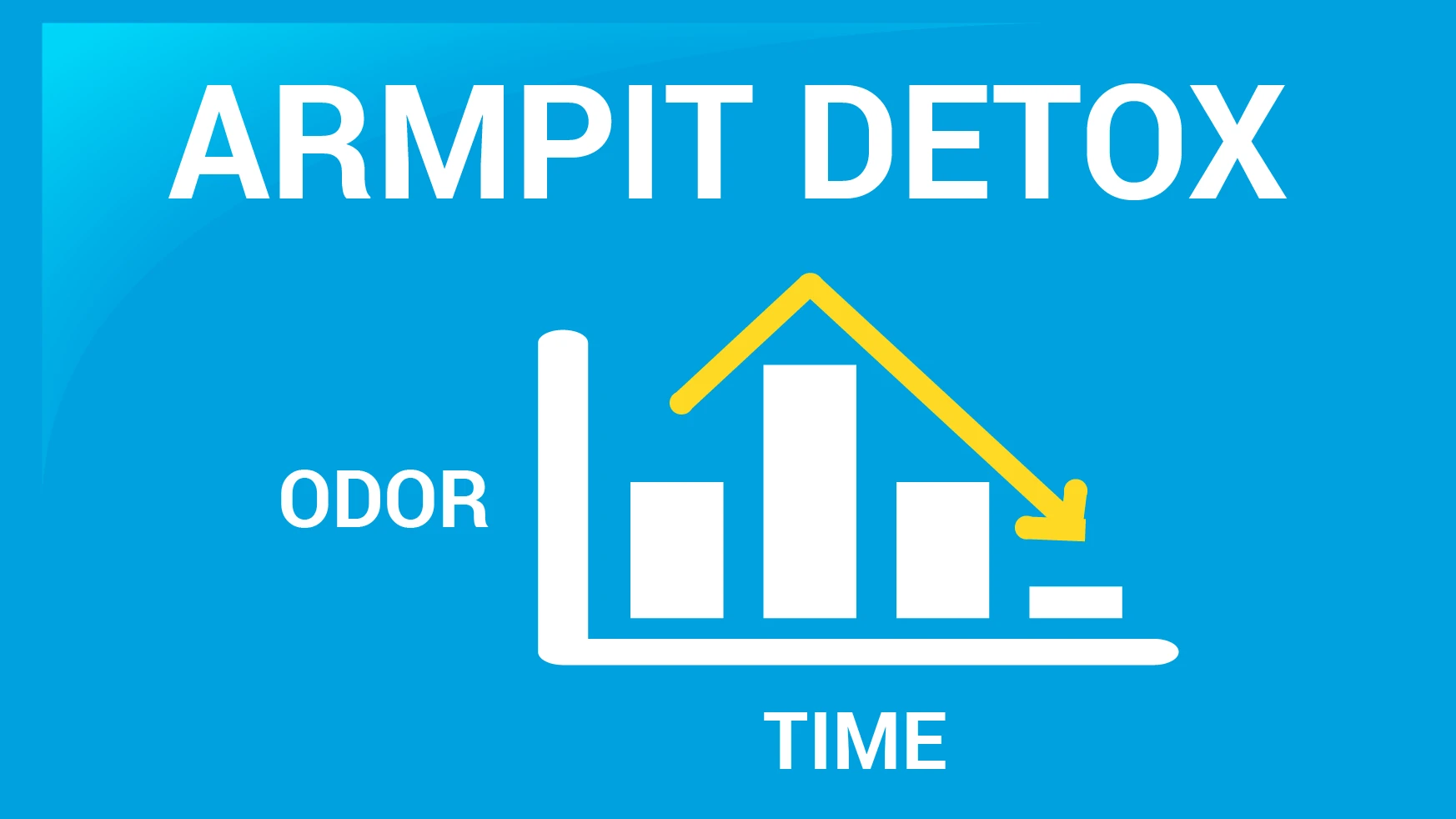
After puberty, the sweat glands in our body secrete an odorless fluid under stress. This is a good thing! Sweat cools the body and excretes substances that are better not left inside the body and it doesn’t actually smell bad.
What causes armpit odor is the way bacteria, hormones, and sulfur compounds break down the excreted fluid as it sits in the moist armpit. Recent studies have identified an enzyme in bacteria Staphylococcus hominis as the primary cause of armpit odor, though other bacteria contribute to the process as well. Each of us has a different combination of bacteria living on our skin all the time, and that microbiome affects how our armpits smell.
To remove armpit odor, it’s important to realize that the armpit microbiome can be affected by many things:
Antiperspirants and deodorants are products designed to reduce or eliminate armpit odor.
Antiperspirants block sweat using aluminum salts that create plugs in the sweat glands.
Deodorants either mask or block odor but not sweat.
Many products on store shelves are both antiperspirants and deodorants.
Recent research has shown that antiperspirants and deodorants affect the armpit microbiome differently. Antiperspirants, unlike deodorants, increase the number of odor-causing bacteria in the armpits.1 So, while they can control odor and wetness, if you stop using them or switch to using deodorant, it can take a while for the armpit microbiome to return to a less-stinky normal.
Apply antiperspirants on clean, dry skin at night. Apply deodorant in the morning or as needed throughout the day to dry skin.
Deodorants can usually also be used to control odor in other sweaty places on the body such as the groin (bikini area), under the breasts, and the soles of the feet.
Both antiperspirants and deodorants may contain irritants such as perfume, alcohol, polyethylene glycol (PEG), propylene glycol (PPG), dyes, or preservatives. So, if you experience irritation from your product, check the ingredients list.
The active ingredients in antiperspirants may be shown on the product label as:
Natural deodorants usually avoid more controversial synthetic ingredients but still may include irritants such as sodium bicarbonate (baking soda). Some will include bacteria-fighting ingredients such as zinc or essential oils. Some essential oils help to kill odor-causing bacteria, but not everyone should use products with essential oils.
Learn more about essential oils in personal care products here.
| Antiperspirant | Deodorant |
|---|---|
| Controls SWEAT and ODOR | Controls ODOR |
| Blocks sweat glands | Does NOT block sweat glands |
| Odor-causing bacteria INCREASE within the armpit microbiome | Odor-causing bacteria DECREASE within the armpit microbiome |
| Apply AT NIGHT to ARMPITS ONLY | Apply ANYTIME to ALL SWEATY AREAS |
More research is needed to answer this question. The research is mixed. It appears that we are more likely to get too much aluminum in our bodies from medications than from the use of antiperspirants.
A study from 20172 showed a possible correlation between antiperspirants and breast cancer, but it did not confirm that antiperspirants caused the cancer.
A 2018 study3 suggests that aluminum salts in antiperspirants may affect the female hormone estrogen in a way that is harmful over time.
Another 2018 study4 found that higher levels of aluminum, mercury, and cadmium were associated with patients with Alzheimer’s Disease. However, the study didn’t prove that the aluminum in antiperspirants was the source of the aluminum found in the patients.
Many experts believe the available research suggests that aluminum in antiperspirants is not a concern for healthy people because most people get rid of excess aluminum in the body through the kidneys. However, the FDA warns that if you have chronic kidney disease you should consult with your doctor before using antiperspirants.
We don’t have a definitive word on the impact of blocking sweat glands. If you’re concerned, consider using a natural deodorant that helps remove armpit odor while allowing your body to operate normally. If you want some tips to deal with wetness, read on.

We use hard-working ingredients in Corum Barrier Repair Malassezia Deodorant to keep you smelling fresh: Totarol (an antioxidant and bacteria-fighting ingredient from the bark of the New Zealand totara tree), Triethyl Citrate (a mild ingredient made from citric acid), and Zinc (a naturally-occurring mineral).
This special deodorant is also Malassezia-safe. It keeps you smelling fresh without triggering the yeast that often contributes to an itchy rash in sweaty places on our skin.
If you’re in a pinch, below are some other ingredients that can help to remove armpit odor. You may need to apply these several times a day. Be aware, all of these can irritate the skin.
Apple cider vinegar applied with a cotton pad may help to control armpit bacteria, but not everyone would consider the smell of vinegar to be an acceptable alternative to body odor. The pH of vinegar is quite low and can irritate skin.
Witch Hazel can help remove armpit odor. I recommend witch hazel that does not contain alcohol. Alcohol can irritate the skin.
Baking soda can fight odor-causing bacteria and also help to absorb sweat. However, the pH of baking soda is quite high and can irritate the skin.

Using aluminum antiperspirants can cause toxins and bacteria to build up in and under the skin due to the clogging nature of those products. Antiperspirants, unlike deodorants, also alter the armpit microbiome by increasing the number of odor-causing bacteria in the armpits.
So, when you allow the clogged pores to breathe, your pits begin to unload all the gunk they’ve been holding onto, and sometimes that’s stinky business. You might actually have smellier pits than ever for a few weeks until your microbiome goes back to normal.
The length of time this process takes will vary because each person’s microbiome is different. You may find you need to apply a bit more often when you first make the switch to a natural deodorant.
Consider cleansing more often during the first few weeks after stopping antiperspirant use. Corum no-rinse Superfruit Hydrating Cleanser makes it easy to soak a cotton pad and swipe sweaty parts throughout the day. For even more convenience, put a few cotton pads in a small container and soak with the cleanser. Take the container with you for on-the-go cleansing.
If you switch from using an antiperspirant to using a natural deodorant, you may wish to speed up the process of recovering a normal armpit microbiome. Consider creating a paste with kaolin clay and plain yogurt with live probiotic cultures. The clay will help to draw out toxins and the probiotics in the yogurt may assist with balancing your bacteria. You may need to apply the paste for 15-20 minutes 1-2 times per week.
You could also use Corum Manuka Mud to speed up the detox process.

Consider talking to a naturopathic doctor who will help you find the cause of your odor. Some remedies may include biofeedback, homeopathy, or acupuncture.
If you sweat excessively there may be an underlying illness that needs to be explored by a medical professional. Your doctor may test you for diabetes or a thyroid condition or discuss medical options such as liposuction, lasers, or surgery to remove sweat glands.
An armpit microbiome transplant may help restore a healthy bacteria balance.6
Don’t worry about perspiring during exercise, which is a very healthy, natural response that helps to rid the body of toxins. Just cleanse and apply a natural deodorant afterward.
However, there are times when keeping dry is preferable. Here are a few suggestions:
I wrote a separate post about how to reduce stress. Check it out.